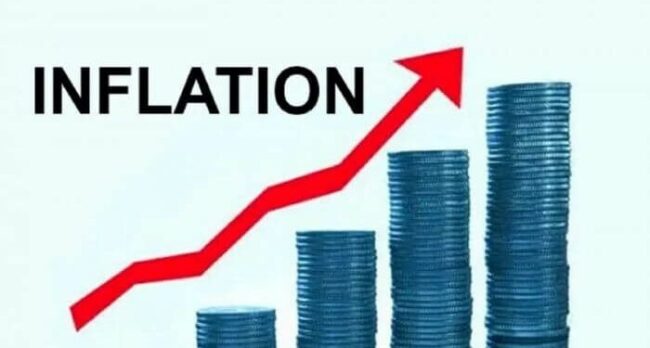The inflation rate in Nigeria rose to 34.60 per cent in November 2024, showing an increase of 0.72 percentage points compared to 33.88 per cent recorded in October 2024.
The National Bureau of Statistics (NBS), while announcing the release of the data on Monday said, “In November 2024, the Headline inflation rate was 34.60 per cent relative to the October 2024 headline inflation rate of 33.88 per cent. Looking at the movement, the November 2024 Headline inflation rate showed an increase of 0.72 percentage points compared to the October 2024 Headline inflation rate.”
The NBS attributed the rise in the inflation rate in November 2024 to the Food inflation rate, which was 39.93 per cent on a year-on-year basis, indicating 7.08 percentage points higher than the 32.84 per cent recorded in November 2023.
On a year-on-year basis, the Headline inflation rate was 6.40 percentage points higher than the 28.20 per cent rate recorded in November 2023.
This shows that the year-on-year headline inflation rate increased in November 2024 compared to the same month in the preceding year of November 2023.
Furthermore, the NBS noted that on a month-on-month basis, the Headline inflation rate in November 2024 was 2.638 per cent, which was 0.002 percentage points lower than the 2.640 per cent recorded in October 2024.
This means that in November 2024, the rate of increase in the average price level is slightly lower than the rate of increase in the average price level in October 2024.
The NBS highlighted that “The percentage change in the average CPI for the twelve months ending November 2024 over the average for the previous twelve-month period was 32.77%, showing 8.76% points increase compared to 24.01% recorded in November 2023.”
The Urban inflation rate on a year-on-year basis, in November 2024 was 37.10 per cent, indicating 6.88 percentage points higher compared to the 30.21 per cent recorded in November 2023.
On a month-on-month basis, the Urban inflation rate was 2.77 per cent in November 2024, showing 0.02 percentage points higher compared to 2.75 per cent recorded in October 2024.
The corresponding twelve-month average for the Urban inflation rate was 35.07 per cent in November 2024, and this
was 9.62 percentage points higher compared to the 25.45 per cent reported in November 2023.
The NBS reported that the Rural inflation rate in November 2024 was 32.27 per cent on a year-on-year basis.
This was 5.84 percentage points higher compared to the 26.43 per cent recorded in November 2023.
On a month-on-month basis, the rural inflation rate in November 2024 was 2.51 per cent, down by 0.02 percentage points compared to 2.53 per cent recorded in October 2024
“The corresponding twelve-month average for the Rural inflation rate in November 2024 was 30.71%. This was 8.00% points higher compared to the 22.71% recorded in November 2023,” the NBS said.
The NBS stated that the rise in Food inflation on a year-on-year basis was caused by increases in prices of the following items; Yam, Water Yam, Coco Yam, etc (Potatoes, Yam & Other Tubers Class), Guinea Corn, Maize Grains, Rice, etc (Bread and Cereals Class), Beer, Pinto (Tobacco Class), and Palm Oil, Vegetable Oil, etc (Oil and Fats Class).
On a month-on-month basis, the Food inflation rate in November 2024 was 2.98 per cent which shows a 0.05 percentage point increase compared to the 2.94 per cent recorded in October 2024.
“The rise is attributed to the rate of increase in the average prices of Mudfish, Catfish Dried, Dried Fish Sadine, etc
(Fish Class), Rice, Yam Flour, Millet Whole grain, Corn flour, etc (Bread and Cereals Class), Agric Egg, Powered Milk, Fresh Milk, etc (Milk, cheese and eggs Class) and Dried Beef, Goat Meat, Frozen Chicken, etc (Meat Class),” the NBS explained.
The average annual rate of Food inflation for the twelve months ending November 2024 over the previous twelve-month average was 38.67 per cent, which was 11.58 percentage points higher compared with the 27.09 per cent average annual rate of change recorded in November 2023.
The NBS stated, “All items less farm produces and energy” or Core inflation, which excludes the prices of volatile agricultural produces and energy stood at 28.75% in November 2024 on a year-on-year basis; an
increase of 6.36% points when compared to the 22.38% recorded in November 2023.
“The highest increases were recorded in prices of the following items; Taxi journey per drop, Bus journey intercity,
Journey by motorcycle, etc (under Passenger Transport by Road Class), Rents (Actual and Imputed Rentals for Housing Class), Meal at a local Restaurant (Accommodation Service Class), and hair cut service, women’s hairdressing, etc (Hairdressing salons & personal grooming establishments class).”
On a month-on-month basis, the core Inflation rate was 1.83 per cent in November 2024.
It stood at 2.14 per cent in October 2024, down by 0.30 percentage points.
The average twelve-month annual inflation rate was 26.64 per cent for the twelve months ending November 2024, this was 6.29 percentage points higher than the 20.35 per cent recorded in November 2023.
The NBS further stated that “In November 2024, All Items inflation rate on a Year-on-Year basis was highest in Bauchi (46.21%), Kebbi (42.41%), Anambra (40.48%), while Delta (27.47%), Benue (28.98%) and Katsina (29.57%) recorded the lowest rise in Headline inflation on Year-on-Year basis.
“On a Month-on-Month basis, however, November 2024 recorded the highest increases in Yobe (5.14%), Kebbi (5.10%), Kano (4.88%), while Adamawa (0.95%), Osun (1.12%) and Kogi (1.29%) recorded the slowest rise on Month-on-Month inflation.
“Food Inflation In November 2024, Food inflation on a Year-on-Year basis was highest in Sokoto (51.30%), Yobe (49.69%), Edo (47.77%), while Kwara (31.39%), Kogi (32.95%), and Rivers (33.27%) recorded the slowest rise in Food inflation on Year-on-Year basis.
“On a Month-on-Month basis, however, November 2024 Food inflation was highest in Yobe (6.52%), Kano (5.95%), and Kebbi (5.68%) while Borno (0.76%), Adamawa (0.90%) and Kogi (1.21%) recorded the slowest rise in Food inflation on Month-on-Month basis.”
ALSO READ FROM NIGERIAN TRIBUNE
JUST IN: Nigeria’s October inflation rate rises to 33.88%
